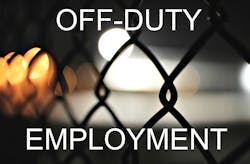Generally speaking, police officers’ salaries are mediocre. Granted, there are cities that pay their officers extremely well, however, that’s the exception rather than the rule. Young cops start with a ridiculously low salary at a time when they need money the most. Many have young families to support - bills like medical insurance, mortgage/rent, utilities, tuition, etc. - drain their bank accounts and cause them to live paycheck to paycheck. I know, I lived that way when I was a young cop.
As a result, many police officers work second jobs to stay current with their expenses. The extra job can extract a heavy toll in terms of creating fatigue and conflicts at home, as well as at their primary job. Worse yet, less time spent with family can cause untold damage to the family structure itself.
Aside from the pay issues, many of the secondary employment jobs cops work are fraught with danger, particularly those where alcohol is served. Working security at nightclubs is one of the worst jobs a cop can have. Loud music, over-served customers, raging hormones, and too many people are a recipe for disaster. Most times all it takes is a snide remark or mean look for fisticuffs to ensue. Of course, once a fracas begins it seems like everyone wants a piece of the action. Suddenly you find yourself alone in the middle of a wild bunch of intoxicated people who want to knock everyone out - including you!
Today’s social climate is such that disagreements and fights rarely end without someone pulling a gun and shots being fired. As security you become the face of the enemy, particularly if you’re wearing your uniform or other identifying clothing. Just like what happens on the job, everyone eventually turns on the police, and as you’re trying to restore order the crowd turns on you.
Not all secondary employment is as potentially dangerous as the above. Escort duty in various forms, such as night bank deposits, closing businesses late at night, traffic control, etc., are types of employment that aren’t taxing in terms of fatigue or stress.
Hours spent working extra jobs can take a toll on the officer as well. Some work up to eight hours at other jobs either before or after their shift. I can recall some of my fellow officers in Chicago working full security shifts at the public schools during the day and then coming in to work the 4 pm-12 am shift. Too many hours means trouble at home and on the job. Fatigue and stress puts you and your colleagues at risk in terms of slowed reaction time and observation skills. A tired cop is a liability.
For that reason, as well as others, many departments manage what jobs their officers can accept and how many hours they can work. Off-duty jobs, just like police work itself, can never be 100% safe. However, if guidelines are established some of the danger can be eliminated. For instance, a department can create a list of jobs approved for secondary employment, as well as the number of hours an officer can work. They may also prohibit employment at places like nightclubs and bars. Uniforms, radios, and cars may be used in the course of secondary employment, thus giving the lone officer a lifeline if he needs assistance.
At some departments, officers use a software program to both search and apply for jobs. The software tracks the number of hours an officer works so no one is pushed beyond their limits. The system is checked by supervisors to ensure no one exceeds the number of allotted hours established by the guidelines.
At some larger police departments such as Los Angeles and New York, a formal program oversees officers in uniform paid as private security. An example is uniformed officers working security at LA Dodgers and Lakers games or at the Hollywood Bowl. In Los Angeles, the City Council established rules that mandate private corporations must contract directly with the department rather than individual officers. This arrangement is a win-win for both the city and the business. It gives greater departmental control over officers’ private employment, and the business benefits by having actual police officers as symbols of authority who are authorized to enforce laws and use deadly force if necessary.
In contrast to LA and NY, some departments issue guidelines for their officers working off-duty that may endanger the officers. For example, in Gary, Indiana officers may provide security in bars, but according to the policy if trouble arises they are not allowed to make arrests. Another provision in their policy states officers may only work a special event, such as a wedding reception, once a year. Still more questionable is a rule citing a departmental code of conduct that states, “An employee working security at a business that suspects a patron has committed a petty crime shall not exercise police authority and must call the Gary Police Department.” This is in direct conflict with the Indiana Criminal Code that does not recognize petty crimes.
Secondary employment will always be an option for cops whose regular salary doesn’t meet their needs. Many of the officers I worked with had second jobs of some sort. Until departments begin to pay a decent living wage, officers are compelled to find other ways to supplement their income.
Stay Safe, Brothers and Sisters!
About the Author
John Wills
John M. Wills is a former Chicago police officer and retired FBI agent. He is a freelance writer and award-winning author in a variety of genres, including novels, short stories and poetry. John also writes book reviews for the New York Journal of Books, and is a member of the National Book Critics Circle. His new book, The Year Without Christmas, is available now. Visit John at: www.johnmwills.com.

